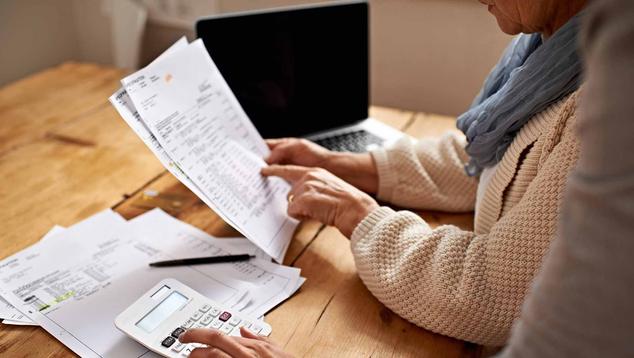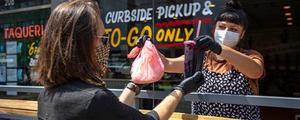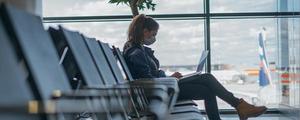Story Highlights
- 76% who are currently saving will keep doing so rather than spending
- 79% of those adding to savings plan to keep it in bank accounts
- 7 in 10 say vaccine will impact willingness to return to normal spending
Editor's Note: The following research was conducted by Gallup in partnership with Franklin Templeton.
WASHINGTON, D.C. -- Despite challenging economic conditions brought on by the ongoing coronavirus pandemic, a slim majority of Americans (54%) say they are currently saving at least a little money. Yet in these uncertain times, they largely plan to keep saving rather than spending in the near term.
Among Americans who are currently able to save money, 76% are planning to continue to add to their savings in the next six months, 28% will purchase basic goods and services, 13% will pay for a vacation or personal travel, and 10% will pay off debts.
| Americans saving a lot or a little | |||||||||||||||||||||||||||||||||||||||||||||||||||||||||||||||||||||||||||||||||||||||||||||||||||
|---|---|---|---|---|---|---|---|---|---|---|---|---|---|---|---|---|---|---|---|---|---|---|---|---|---|---|---|---|---|---|---|---|---|---|---|---|---|---|---|---|---|---|---|---|---|---|---|---|---|---|---|---|---|---|---|---|---|---|---|---|---|---|---|---|---|---|---|---|---|---|---|---|---|---|---|---|---|---|---|---|---|---|---|---|---|---|---|---|---|---|---|---|---|---|---|---|---|---|---|
| % | |||||||||||||||||||||||||||||||||||||||||||||||||||||||||||||||||||||||||||||||||||||||||||||||||||
| Continue to add to savings | 76 | ||||||||||||||||||||||||||||||||||||||||||||||||||||||||||||||||||||||||||||||||||||||||||||||||||
| Spend it on basic goods and/or services | 28 | ||||||||||||||||||||||||||||||||||||||||||||||||||||||||||||||||||||||||||||||||||||||||||||||||||
| Spend it on a future vacation/personal travel | 13 | ||||||||||||||||||||||||||||||||||||||||||||||||||||||||||||||||||||||||||||||||||||||||||||||||||
| Use it to pay off existing debt | 10 | ||||||||||||||||||||||||||||||||||||||||||||||||||||||||||||||||||||||||||||||||||||||||||||||||||
| Franklin Templeton-Gallup Economics of Recovery Study, Aug. 3-11, 2020 | |||||||||||||||||||||||||||||||||||||||||||||||||||||||||||||||||||||||||||||||||||||||||||||||||||
These readings are from the latest opt-in survey for the Franklin Templeton-Gallup Economics of Recovery Study conducted Aug. 3-11, after benefits from the coronavirus aid bill expired. Among those benefits were an additional $600 per week in unemployment assistance and a federal moratorium on evictions for not paying rent. Congress has yet to agree on a new relief package and is in recess until after Labor Day, while the U.S. unemployment rate remains near the highest on record.
Most of those who are adding to their savings are keeping at least some of that money liquid, as 79% say they are putting it in their checking or savings account. Far fewer say they have increased their contributions to a 401(k) or other retirement account, invested in the stock or bond market, put it into real estate, or invested in other assets.
| Americans who are adding to savings |
|||||||||||||||||||||||||||||||||||||||||||||||||||||||||||||||||||||||||||||||||||||||||||||||||||
|---|---|---|---|---|---|---|---|---|---|---|---|---|---|---|---|---|---|---|---|---|---|---|---|---|---|---|---|---|---|---|---|---|---|---|---|---|---|---|---|---|---|---|---|---|---|---|---|---|---|---|---|---|---|---|---|---|---|---|---|---|---|---|---|---|---|---|---|---|---|---|---|---|---|---|---|---|---|---|---|---|---|---|---|---|---|---|---|---|---|---|---|---|---|---|---|---|---|---|---|
| % | |||||||||||||||||||||||||||||||||||||||||||||||||||||||||||||||||||||||||||||||||||||||||||||||||||
| Increased money in checking or savings account | 79 | ||||||||||||||||||||||||||||||||||||||||||||||||||||||||||||||||||||||||||||||||||||||||||||||||||
| Increased contributions to 401(k), IRA, Keogh or other retirement savings account | 24 | ||||||||||||||||||||||||||||||||||||||||||||||||||||||||||||||||||||||||||||||||||||||||||||||||||
| Invested in stock/bonds market | 17 | ||||||||||||||||||||||||||||||||||||||||||||||||||||||||||||||||||||||||||||||||||||||||||||||||||
| Invested in real estate | 5 | ||||||||||||||||||||||||||||||||||||||||||||||||||||||||||||||||||||||||||||||||||||||||||||||||||
| Invested in other assets (e.g., commodities, cryptocurrency, foreign currencies) | 3 | ||||||||||||||||||||||||||||||||||||||||||||||||||||||||||||||||||||||||||||||||||||||||||||||||||
| Franklin Templeton-Gallup Economics of Recovery Study, Aug. 3-11, 2020 | |||||||||||||||||||||||||||||||||||||||||||||||||||||||||||||||||||||||||||||||||||||||||||||||||||
Vaccine Will Affect Spending More Than Other COVID-19 Advancements
Gallup asked respondents to assess the impact that six potential COVID-19 advancements might have on their willingness to return to their normal spending level. These include the development of a vaccine, personally receiving a vaccine, having an effective treatment for COVID-19, seeing a reduction in cases of the disease or deaths from it, and having extra capacity at hospitals.
An effective COVID-19 vaccine ranks as most influential to Americans when they think about resuming their normal spending. About seven in 10 say the development of such a vaccine would have a minor or major impact on their willingness to start spending regularly. Receiving an effective vaccine would have about the same impact.

GRAPH ALT TEXT: Bar chart. Impact that six potential COVID-19 advancements might have on Americans' willingness to return to their normal spending level. These include the development of a vaccine (45% major impact, 26% minor), personally receiving a vaccine (43% major, 26% minor), having an effective treatment for COVID-19 (30% major, 34% minor) seeing a reduction in cases of the disease (26% major, 34% minor) or deaths from it (26% major, 33% minor), and having extra capacity at hospitals (18% major, 29% minor).
At the same time, 64% of Americans say a treatment that would reduce the probability of death by 50% for the sickest patients would affect their resumption of spending. Three in five U.S. adults say having no more than 10 COVID-19 cases in their local area over a 14-day period would affect their spending, and nearly as many say the same for having no new deaths in their area for 14 days. Fewer than half say extra hospital capacity would be a trigger for adjusting their spending.
Implications
With consumer spending traditionally driving approximately 70% of the U.S. economy, it appears that a broad and consistent economic recovery may depend primarily on the development of an effective vaccine. Having effective treatments or sharply reduced infection rates will provide some comfort to citizens, but not to the same degree as a vaccine. Until then, a majority of Americans plan to moderate their overall spending compared with pre-pandemic levels, which means unemployment and underemployment are likely to persist at elevated levels for the foreseeable future.
To receive ongoing updates on the Franklin Templeton-Gallup Economics of Recovery Study's findings, please sign up here. To read the project announcement press release, please visit this page.
If you are a member of the media who would like to learn more about the project's findings and release schedule, please reach out to Riley_Brands@gallup.com.




